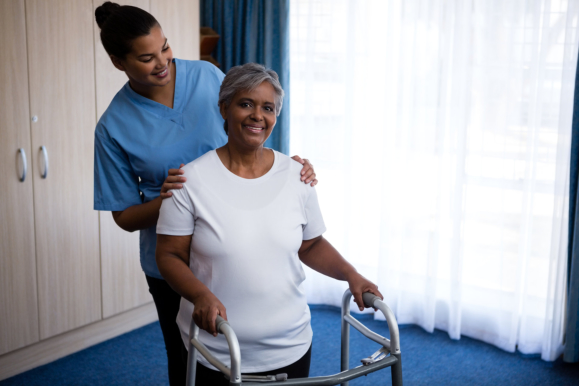Lessen Your Loved One’s Risks of Falling With These Tips

In a survey conducted by the Center for Disease Control and Prevention, 25 percent of seniors ages 65 and older, suffer a fall every year. Accidents among the elderly account for 2.8 million injuries and 27,000 deaths — many are inflicted with head trauma, hip fractures, and lacerations caused by these falls.
Given that falls are the leading cause of injury and death among the elderly, you may be concerned about your parent, grandparent or other family members. Acquiring top-quality home care services in Bloomfield, New Jersey is an effective way of minimizing the causes and incidence of falls in your senior loved ones home.
What Are the Risks of Falling?
People who fall can suffer serious injuries, such as broken bones or head injuries. Falls can also lead to less visible damage, including emotional distress, fear of falling again, and dependence on others for help with their daily activities. The risk of falls increases with age – the average person over the age of 80 years old falls about every 10 days.
Falls and falls prevention are important to most seniors. Falling is the main cause of deaths for seniors older than 75 years of age.
What Increases My Loved One’s Risk of Falling?
Immediate risk factors for falls are related to changes in physical health (e.g. dizziness or loss of balance), mental health (e.g. depressed or anxious mood), and social and environmental factors (e.g. changes in housing).
Additional risk factors are related to cognitive function (decreased ability to use vision and judgement), finances (not enough money), and personal safety (lack of knowledge or poor judgment).
What Are the Risk Factors I Cannot Control?
Your loved one may be at greater risk of falls if she takes medications or has certain medical conditions. The risk of falls increases when more than one medication is prescribed, particularly when they are used together.
Relevant medications may include:
• Medicines that affect vision (e.g. anti-glaucoma or low vision drugs, anti-Parkinson’s medications)
• Over-the-counter pain killers (e.g., aspirin, acetaminophen) or fever reducers and cold remedies (e.g., Sudafed, Pepto Bismol)
• Prescription medications for depression, such as neuroleptic agents (e.g. Clomipramine, Haldol, Mellaril), monoamine oxidase inhibitors (e.g., Nardil), psychotherapy (e.g., cognitive-behavioral therapy, dialectical behavior therapy).
• Metabolic and endocrine medications (e.g. lithium salts for bipolar disorder)
• Oral anticoagulants used to prevent heart attacks and strokes (Pradaxa).
• Anesthesia medications used to prevent heart attacks in surgery or before certain operations (Propofol).
• High blood pressure medications (e.g. beta blockers such as Tenormin, Propranolol, Atenolol).
If you use your loved one’s medication records to identify potential issues, you may find that the health care team are not aware of all of your loved one’s medications and supplements. Enlist the help of your family doctor or pharmacist to determine if any of the current prescriptions can be discontinued or if they interact with her other medications.
Here are a few more actions you can take to lessen your senior’s risk of falling:
- Make sure to engage them in regular exercise
Most falls among the senior community are caused by muscle weakness. Strengthen their bones and muscles with appropriate exercise suggested by your provider of senior care in New Jersey.
Here are some simple home exercises you can try:
Find a Balance Between the Arms and the Legs: Keep Them Moving
It sounds simple enough, but in order to avoid falls, just make sure both their arms and legs are moving together at the same time.
Get Down on The Floor with Them Before You Initiate Exercise
Before starting any kind of exercise, get down to a level where your loved one can comfortably lie or sit on the floor. If they’re afraid to fall, it’s obviously going to be difficult for them.
Isolate the Risky Movements: Get Them Started Slowly
Keeping everything moving in small increments is probably the most important thing when it comes to exercising safely. You don’t want to have your loved one start running on the spot or jumping around, but rather begin with infinitesimal movements and maybe a warm-up.
Use Their Exercise App: If they Need Extra Motivation
This is an app you can purchase for your tablet or phone that will track all their exercises and their progress. It’ll help get them more excited about taking care of themselves and their body as it’ll provide them with constant feedback infusing motivation.
- Clean up spills immediately after they are made to avoid slips and trips
Keep in mind that your loved one’s eyesight is not what it used to be when they were younger. Also, make sure to rid all pathways of clutter that they can stumble over.
- Check their medication
There are a few drugs that have side-effects that may make your loved ones feel dizzy or out-of-sorts. Make sure that they have quality nursing care in New Jersey to help them manage their medication.


